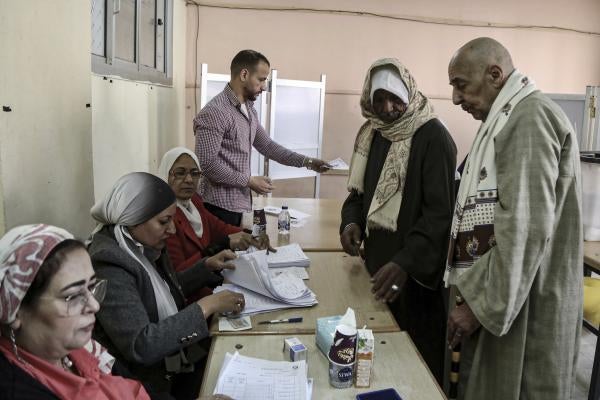Lire la version en français / Lea la versión en español
When I see authoritarian regimes holding bogus elections and then announcing results with absurdly high vote tallies for the dictator, I often wonder how the specific winning percentage is decided. I imagine a committee of people sitting around a table and fierce debates like:
“I say he should win with 95 percent. Anything less would be an embarrassment and an insult to our great leader!”
“No, no, it should look more credible, like 85 percent. People won’t believe 95 percent!”
“Order, order! Esteemed ladies and gentlemen of the High Council of Election Rigging, it’s getting late, and we need to come to a decision. Can we please find a compromise figure we can agree on?”
Now, I doubt my fantasy scenario is how things really work in dictatorships but I do know that Egyptian authorities yesterday announced that President Abdel Fattah al-Sisi had “won” a third six-year term with 89.6 percent of the vote.
I also know his unbelievable victory followed a wave of arrests, intimidation, and excessive requirements for candidates that essentially prevented meaningful competition. In the months leading up to the election, security forces stifled peaceful protests. They harassed, detained, and prosecuted dozens of journalists, as well as political and human rights activists.
In particular, authorities targeted perceived supporters and family members of Ahmed Tantawy, a vocal opponent of the country’s rulers and a potential presidential challenger whose candidacy the authorities eliminated by preventing him from qualifying.
In the words of my colleague and expert, Amr Magdi: “It is clear that the election was a meaningless charade in which Sisi was unwilling to face a real challenger.”
None of this is new for Egypt, he explains. Under Sisi’s rule, the military has strengthened its control over all aspects of Egyptians’ lives, and repression has largely destroyed civic space – that is, activities independent of the authorities. The right to political participation is essentially ignored in the country.
Thousands of perceived critics have been wrongly jailed, often in horrendous conditions. The courts are no more than another obedient tool of the government’s repression.
Meanwhile, the European Union is seeking closer ties with Sisi’s regime, forging ahead with negotiations on an upgraded bilateral partnership agreement. The deal will likely include additional political and economic support for Egypt without addressing some of the root causes of the country’s dire economic situation, like its systematic repression.
My vision at the beginning here of a “High Council of Election Rigging” was pure fantasy, of course. But it’s nothing compared to the fantasyland Egypt’s partners seem to live in with their supportive approach to authoritarian brutality.






